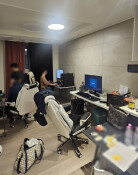[Editorial] Time for Deregulation is Now
[Editorial] Time for Deregulation is Now
Posted September. 05, 2008 07:17,
Sixty thousand square meters of undeveloped land are filled with flowers in the vicinity of Hynix Semiconductors factory in Icheon, Gyeonggi Province. Hyundai Electronics, Hynixs predecessor, purchased the plot in 1983 to set up more factories. The land, however, has remained idle for 26 years and is now just flower beds or vegetable fields due to developmental regulations in metropolitan areas.
KCC Engineering & Construction is in urgent need of extra glass factories in Yeoju, Gyeonggi Province, but the Seoul Metropolitan Area Readjustment Planning Act, which bans business expansion in the metropolitan area, has prohibited the company from building them. So business leaders plan to urge permission for the two companies in talks with President Lee Myung-bak Sept. 18. Given that lackluster investment hinders economic development, this matter will prove whether the incumbent administration is sincerely pursuing a business-friendly environment.
Though the act was introduced to help protect the environment and prevent population growth in the metropolitan area, it has done more harm than good by imposing overlapping business regulations and hindering investment in cutting-edge technologies. Developmental restrictions in Seoul and vicinity have made corporations move their operations overseas, postpone investment, and even close their businesses. Experts say hard-pressed Hynix will consider building factories in China. Almost 1,000 companies based in Gyeonggi Province is estimated to flee the country every year. When companies go overseas, capital flight and the disappearance of jobs will ensue.
The previous Roh Moo-hyun administration restricted development in the capital through the excuse of balanced national development. Today, the Lee administration, which presented deregulation of the metropolitan area as an election pledge, is sitting idly by for fear of opposition from provinces. Presidential decrees specify every detail needed to implement the act, such as the scope of the metropolitan area, types of facilities that trigger population growth, and restricted activities. That means the government can revise the law without parliamentary intervention.
Facility investment declined 0.9 percent in the first quarter and rose 0.1 percent in the second. The extra incomes of 546 listed manufacturers, however, reached 392 trillion won in June. They are saving funds amounting to 6.9 times their capital. The majority of Korean companies in China want to return home as Beijing`s labor intervention has intensified. Now is the time to push forth deregulation.
Japan began easing restrictions on the Tokyo metropolitan area in 2002 after a suffering from a recession dubbed the lost decade. Deregulation helped Honda Motor spend 30 billion yen (about 315 billion won) on construction. Last year in Japan, 1,782 factories were built, more than double than in 2002. The growing number of factories created a large number of jobs. Its pathetic to watch one million Korean youths languishing in a tight job market, while those in Japan can choose from so many jobs.







